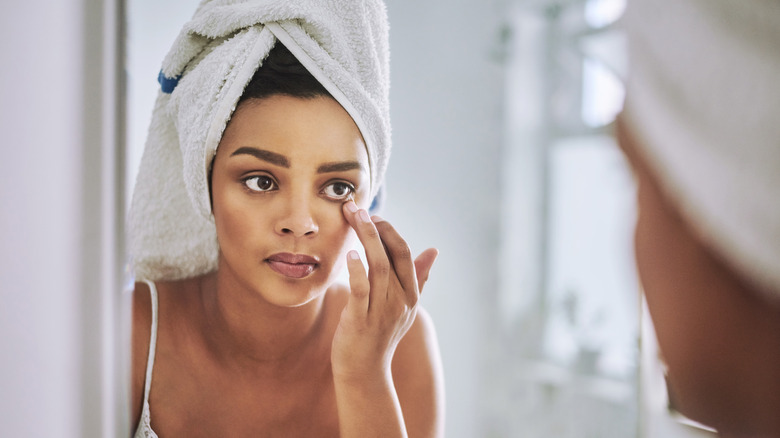Here's Why You May Be Getting Dry Skin Around Your Eyes
We may receive a commission on purchases made from links.
Dry skin around the eyes can come from a number of different things, but no matter the cause, the symptoms can be very uncomfortable. When the skin around the eyes gets dry and irritated, the area often gets flaky, itchy, and scaly. The skin can get red and irritable, and the experience is very uncomfortable.
The skin around the eyes requires some extra TLC, no matter what's going on there. The skin under our eyes is thinner and more fragile than anywhere else on the face. On top of that, the area is under regular movement, because 22 different muscles in the area are at work, allowing us to show expression around our eyes. Smiling, laughing, frowning, and any other facial expression activates the eye area, so there's a lot of movement there. There are also notably fewer oil glands and collagen in the eye area, so the skin around the eyes tends to show signs of aging sooner than other parts of the face, according to the Journal of Advanced Biomedical Research. For all of these reasons, applying an eye cream correctly and consistently is crucial for maintaining hydrated skin. But even with a regular eye cream, it's still possible that you might experience dry skin around your eyes for a number of reasons.
Cold weather takes all kinds of tolls on skin
If nothing else in your routine has changed but the skin around your eyes is dryer than usual, it could be a change in season. Colder months are hard on the skin. Not only is the weather harsher, but central heating is notorious for drying out our skin. There's less humidity in our bedroom as we sleep, and our skin, particularly the fragile eye skin, can take a toll. For starters, you need to edit your skincare routine to meet these winter needs. Opt for an eye cream that's more hydrating during cold months. Look into sleeping with a humidifier in your room, and turn down the heat if possible.
Hot water is also very drying on the skin, and during cold weather, we're more likely to want to warm up under a hot shower. When we wash our faces, we're also more likely to turn up the heat since it's so cold outside. "Look for hydrating cleansers and moisturizers containing humectants and occlusives which will add moisture to the skin, and protect against loss of water from the skin surface," dermatologist Dr. Derrick Phillips told Glamour. Dr. Phillips also suggested that we "avoid excessively hot showers and baths, as hot water can strip the skin of natural oils, exacerbating dryness caused by central heating." Sun exposure and aging in general contribute to a loss of moisture around the eyes, so sunglasses and a rich eye cream are our best bets.
Irritants and allergies can cause dry skin around the eyes
There can be other factors for why we're experiencing dry skin around our eyes. Irritants and allergies can be responsible for drying out the area around our eyes, and this is called contact dermatitis. It's a temporary skin condition and is relieved when the irritant — be it a perfume, a new skincare product, or an air pollutant — goes away. If you've introduced something new to your regimen, take a break from it for a few days and see if the condition clears up. Even eyedrops can cause problems. "Some eyedrops can dry out the skin under the eyes," dermatologist Dr. Jessica Wu, M.D. told Murad. Antihistamine products can also be responsible for this.
There are other factors to keep in mind too. You could be experiencing ocular rosacea, a form of eczema, or even ocular psoriasis. Dermatologist Dr. Christina Weng told Real Simple that if these conditions persist, it's time to seek out a dermatologist or an ophthalmologist. "If dry eyelids do not resolve with conservative treatment, [if you] develop a rash or breaks in the skin, [or if your eyes] become red or swollen or painful, it's time to see a doctor," Dr. Weng explained. Try to illuminate all suspected irritants and use a warm compress; however, if nothing's alleviating these concerns, it's best to ask a doctor.


